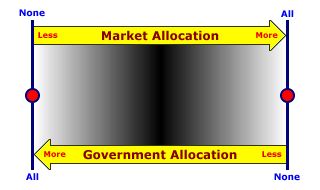
|
|
LONG-RUN MARGINAL COST: The change in the long-run total cost of producing a good or service resulting from a change in the quantity of output produced. Like all marginals, long-run marginal cost is the increment in the corresponding total. What's most notable about long-run marginal cost, however, is that we are operating in the long run. Unlike the short run, in which at least one input is fixed, there are no fixed inputs in the long run. As such, there is only variable cost. This means that long-run marginal cost is the result of changes in the cost of all inputs.
Visit the GLOSS*arama
|
|


|

|
                           PURE MARKET ECONOMY: An economy, or economic system, that relies exclusively on markets to allocate resources and to answer all three questions of allocation. This theoretical ideal has no governments, markets are used to make all allocation decisions. Then contrasting theoretical ideal is a pure command economy in which governments make all allocation decisions. | Economic Systems |  |
A pure market economy is a theoretical extreme on the spectrum of economic systems that does not actually exist in the real world. It does, however, provide a benchmark that can be used for comparison with real world economic systems. In pure market economies, markets are used by buyers and sellers to voluntarily exchange goods, services, and resources. Buyers seek to pay the lowest prices. Sellers seek to receive the highest prices. Resources are allocated to the production of the goods with the highest prices and greatest satisfaction of wants and needs. The real world embodiment of a pure market economy is termed a market-oriented economy or capitalism. The market-oriented economy of the United States is the primary example. While, in theory, resource allocation could be undertaken exclusively through markets or governments, in the real world, all economies rely on a mix of both markets and governments for allocation decisions, what is termed a mixed economy.

Recommended Citation:PURE MARKET ECONOMY, AmosWEB Encyclonomic WEB*pedia, http://www.AmosWEB.com, AmosWEB LLC, 2000-2025. [Accessed: July 18, 2025].
Check Out These Related Terms... | | | | | | | |
Or For A Little Background... | | | | | | |
And For Further Study... | | | | | | |
Search Again?
Back to the WEB*pedia
|



|

|
PINK FADFLY
[What's This?]
Today, you are likely to spend a great deal of time calling an endless list of 800 numbers wanting to buy either a weathervane with a cow on top or a box of multi-colored, plastic paper clips. Be on the lookout for high interest rates.
Your Complete Scope
This isn't me! What am I?
|

|
|
Junk bonds are so called because they have a better than 50% chance of default, carrying a Standard & Poor's rating of CC or lower.
|

|
|
"A winner is someone who recognizes his God-given talents, works his tail off to develop them into skills, and uses those skills to accomplish his goals. " -- Larry Bird, basketball player
|

|
SWIFT
Society for Worldwide Interbank Financial Telecommunications
|

|
|
Tell us what you think about AmosWEB. Like what you see? Have suggestions for improvements? Let us know. Click the User Feedback link.
User Feedback
|


|


